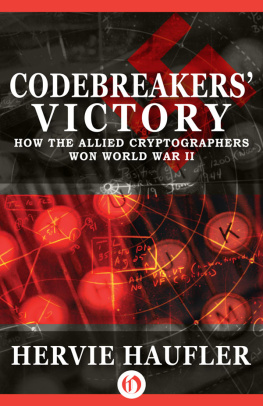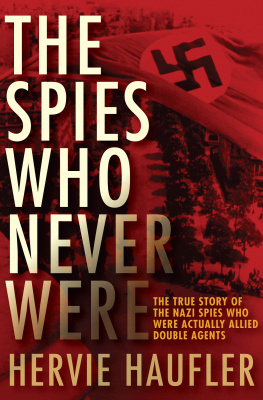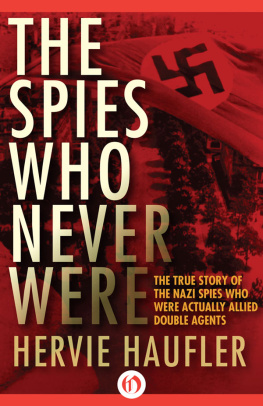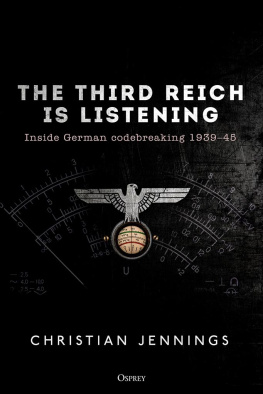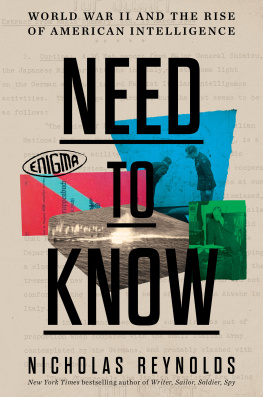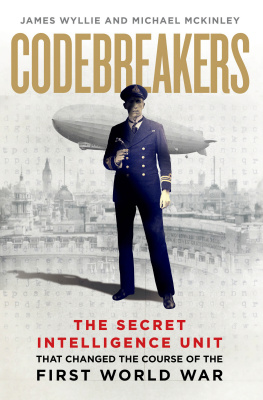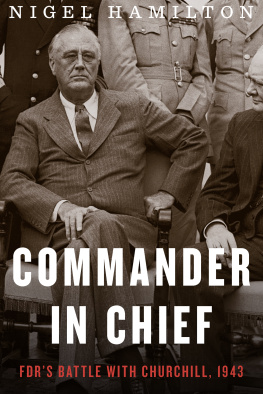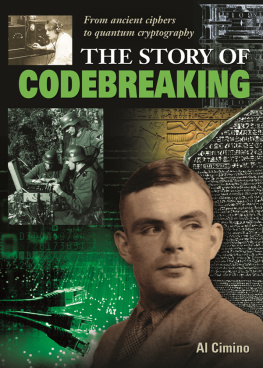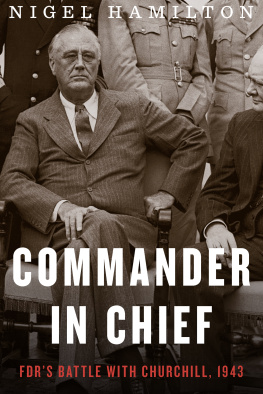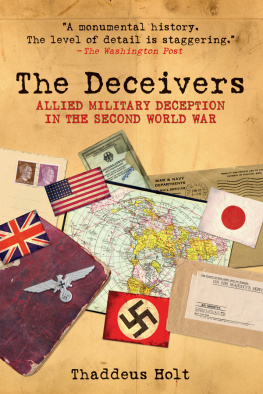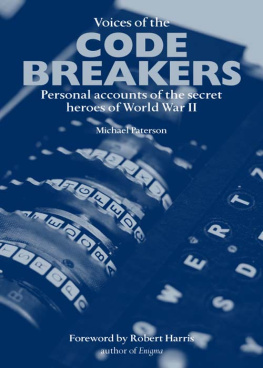Codebreakers Victory
How the Allied Cryptographers Won World War II
Hervie Haufler

For my untiringly supportive family: Patricia, Christopher and Marsha, Jonathan and Carolyn
Introduction
Within the history of World War II lies a vital story that has become public knowledge only decades after the war's end: the role cryptanalysts played in securing the Allies' victory. The story remained cloaked for so long because, with victory won, the cryptanalytic geniuses and their thousands of support staffers pledged themselves to secrecy about their wartime activities. It was only when Allied military authorities agreed that relaxing their hold on disclosure would no longer harm their national interests that the full story of the codebreakers began to emerge.
As more and more details have come to light, growing awareness of the codebreakers' impact on the course of the war has forced revisions in its history and in the perceptions of many of its prominent figures. Yet these changes have seemed to come grudgingly. Histories written after the code-breaking revelations became available to the public frequently give the impression that the cryptanalysts' efforts were mere appendages to the larger war, inconvenient afterthoughts that had to be tacked on simply for accuracy's sake.
Furthermore, the effects of the codebreakers' successes have been given a standardized assessment: they shortened the war and saved thousands of lives. These are, to be sure, no small accomplishments. Survivors of the cryptologic war have, themselves, tended to accept that the sum total of their work was that they knocked a couple of years off the war's calendar and kept legions of men, women and children from becoming war victims.
This book's argument is that the tacked-on acknowledgment of cryptanalytic successes and the mantralike repetition of the results of those successes sell the codebreakers short. Their contributions to the Allies' triumph amount to more than thata great deal more. An in-depth probe into those hundreds of thousands of decrypted enemy messages and a study of how Allied leaders used them in developing their battle plans leads to a different conclusion: that the tremendous advantage given to the Allies by the code-breakers was no less than the decisive factor tipping the scales in the war.
To state this book's premise another way, if a fully informed jury could sit in judgment to select the men who most influenced the war's outcome, it would pass over the celebrated heroesthe generals such as Dwight Eisenhower, Bernard Montgomery and Douglas MacArthur, and the admirals Chester Nimitz, Bull Halsey and their ilk. Instead, it would single out much less heralded men, including Poland's Marian Rejewski, Jerzy Rycki and Henryk Zygalski; Britain's Alan Turing, Gordon Welchman, Max Newman and Tom Flowers, and America's William Friedman, Frank Rowlett, Joseph Rochefort and Thomas Dyer. These were the individuals who led the way in deciphering enemy radio-transmitted messages that bestowed upon Allied commanders the great boon of "playing a card game with your opponent's cards visible to you."
Axis cryptologic teams had some codebreaking successes, and by these means inflicted grievous losses on the Allies. But their breakthroughs diminished as the war progressed, largely because the Allies' superior mastery in cryptanalysis revealed when their own forces' ciphers were being penetrated. As a result, Axis commanders were increasingly blinded in making their decisions while Allied leaders moved with ever greater certainty.
The stories of star-studded pistol-packing generals inherently make for more rollicking reading than those of analysts locked away in rear echelon cells solving the intricacies of military ciphers. But there is an added reason why the personalities and exploits of the codebreakers are known far less than those of the top brass. The generals and admirals could begin to trumpet their triumphs the day after the war endedand often before. The cryptologists, on the other hand, were sworn to silence by those pledges they signed at the war's end.
Soon after V-J Day, congressional hearings into the debacle at Pearl Harbor forced some disclosures of the U.S. codebreaking efforts against Japan. But in England, even though more than ten thousand men and women were involved in various aspects of the codebreakingincluding nearly five hundred Americansno word of their achievements leaked out until thirty years after hostilities had ceased. Winston Churchill, a great admirer and advocate of Britain's cryptologic program, spoke of his codebreaking team in a visit to their center at Bletchley Park as "the geese that lay the golden eggs but never cackle."
Churchill himself respected the secrecy pledge. In all his many volumes of World War II history, he included no more mention of the codebreaking than an occasional oblique reference to "special intelligence" or "trustworthy sources." In this regard, his reporting is incomplete. One can imagine, if he had lived, what joy he would have taken in revising his scripts to give full recognition to his secret weapon.
This book can do what Churchill was duty-bound not to do. It can present the evidence that codebreaking in World War II was the single most important factor enabling the Allies to win the war.
The first step toward Allied victory came when Polish cryptanalysts, as early as 1932, began breaking the Germans' supposedly impregnable Enigma code machine and then, on the brink of war, turned their discoveries over to their French and British allies.
At that point, the story passes primarily to the British who, at Bletchley Park (BP), assembled the masterminds and their support staff to carry the Poles' technologies to new levels of proficiency. Bletchley cryptanalysts made inroads into German codes within a few months of the war's beginning. But these early successes came too soon to have effect against the overwhelming might the Germans displayed in their invasion of Norway and their blitzkriegs in France. Together with Britain's superiority in radar development, however, BP's decrypts, code-named Ultra, helped British air marshal Hugh Dowding prevent the Germans from sweeping the skies clear of the Royal Air Forcewhich Adolf Hitler saw as a prerequisite to the invasion of England. Decrypts of Italian codes were also key factors in two of the first British victoriesover the Italian armies in North Africa and the Italian navy in the Battle of Matapan.
British codebreaking fully came into its own as a precursor to victory in the long, seesaw Battle of the Atlantic. Analysis of that struggle provides convincing evidence that Britain's gradual advance to dominance in cryptology was a key factor in preventing the German high command from using its U-boats, surface raiders and Luftwaffe aircraft to sever Britain's supply lifeline and starve the English into submission. With U.S. entry into the war, American signals intelligence (Sigint) teams joined in turning the tide so that German losses became so great they were forced to withdraw their U-boats from the North Atlantic and grant Allied convoys virtually free passage.
U.S. cryptanalysts' greatest contribution to Allied victory was their mastery of Japanese codes. The first American successes, code-named Magic, were against the code machines used by Imperial diplomats. Because Japanese militarists scorned including the diplomatic corps in their plans, however, U.S. decrypts provided no definite warning of the attack on Pearl Harbor. Afterward, U.S. Navy analysts quickly began breaking the code-book messages of the Imperial Navy. Their decrypts prevented another Pearl Harbor by revealing Japanese plans for a second surprise attackthis one on Midway atoll. Japanese admiral Isoroku Yamamoto hoped that his assault on Midway would draw what was left of the U.S. Pacific fleet to its doom. Hawaii-based codebreakers made sure there would be no follow-up Japanese surprise. They gave Admiral Nimitz the information he needed to place his fleet so that planes from his carriers, along with those from the island itself, could descend unexpectedly on the Japanese ships. When all four of the Japanese carriers were sunk, the battle was over and the Japanese retreated. Midway, described by Nimitz as "a victory of intelligence," changed the entire course of the Pacific war by ending the long march of triumphs by the Japanese and putting them immediately on the defensive.

